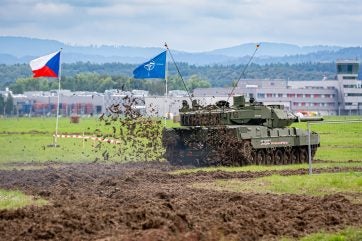
Amidst growing security concerns in Europe, the Czech Republic is ramping up its defence budget, signalling a shift towards modernising its armed forces and strengthening international partnerships.
The Czech Republic is undergoing an overhaul of its defence capabilities, with a particular emphasis on modernisation efforts within both the Army and Air Force. According to GlobalData’s “Czech Republic Defense Market 2023-2028” report, the country’s defence budget is set to soar to $7.7bn (Kč181.7bn) by 2028, recording a Compound Annual Growth Rate (CAGR) of 9.1%.

Discover B2B Marketing That Performs
Combine business intelligence and editorial excellence to reach engaged professionals across 36 leading media platforms.
The surge in defence spending is fueled by the imperative to upgrade outdated military platforms and enhance readiness for high-intensity conflict scenarios. Notable acquisitions include the replacement of leased J-39 Gripens with participation in the F-35 programme, introducing capabilities like electronic warfare and long-range strike capabilities.
The Czech Republic finalised the deal to purchase 24 Lockheed Martin F-35 Lightning II jets, enhancing its defence capabilities and reinforcing NATO’s deterrence. The first batch is scheduled for delivery in 2031.
In 2023, the Czech Republic also decided to enhance its military transport capabilities by negotiating the acquisition of two Embraer C-390 Millennium multi-mission aircraft. The C-390 enhances the Czech Republic’s preparedness for missions, including cargo and troop transport, medical evacuation, and humanitarian operations.
The modernisation drive extends to the Army, focusing on restructuring formation structures to meet evolving security needs, augmenting standing strength, and establishing an active reserve force.

US Tariffs are shifting - will you react or anticipate?
Don’t let policy changes catch you off guard. Stay proactive with real-time data and expert analysis.
By GlobalDataFurthermore, the Czech Republic prioritises investments in emerging technologies such as drones and modern air defence systems to adapt to evolving security challenges. Defence cooperation with allies, particularly within NATO, has intensified, focusing on joint forces operations and interoperability. The country actively participates in EU-led security initiatives, leveraging platforms like the European Defense Fund to foster research in defence technologies.
Navigating the defence procurement landscape, the Czech Ministry of Defense faces the challenge of aligning its processes with EU guidelines and NATO compatibility.
The Czech Republic’s military modernisation drive has been fuelled by the need to replace equipment donated to Ukraine following Russia’s invasion, and also to improve its capabilities in the face of regional tensions caused by this.
An example of this is the Czech Republic, Denmark, and the Netherlands joining forces in an agreement to enhance Ukraine’s defence capabilities, facilitating the supply of weaponry and military equipment. The agreement involves the provision of modern and refurbished military equipment, including tanks, howitzers, small arms, and air defence systems.





